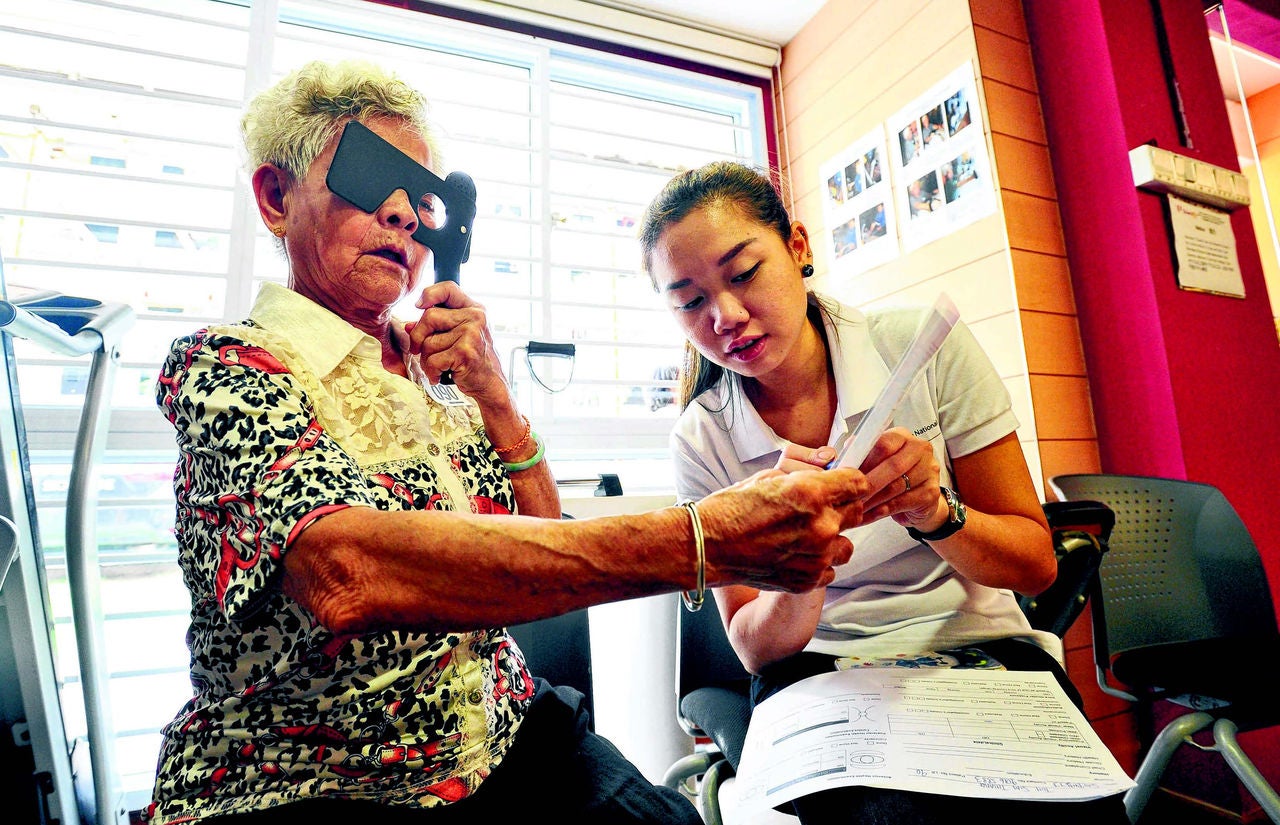
getting her eyes checked by nurse Yolane Chew, 24, in the mobile clinic yesterday. Of the 1,800 seniors screened under the project, 1,000 need follow-up treatment. They have been given referrals to seek treatment at hospitals. Their first consultation is free. ST PHOTO: LIM YAOHUI
Mobile clinic, which has been running since 2014, has screened 1,800 elderly residents
A community eye-screening project that has helped around 1,800 needy elderly residents will likely be extended when it ends this year.
The Mobile Eye Clinic (MEC), a project by both the Singapore Society of Ophthalmology and Standard Chartered bank, has been providing free eye check-ups for elderly folk above the age of 65 since 2014.
The eighth mobile clinic, was held yesterday at the SilverACESenior Activity Centre in Lengkok Bahru, where about 200 residents received free eye checks.
Associate Professor Lee Shu Yen, president of the Singapore Society of Ophthalmology, told The Sunday Times yesterday that the project, which was given a grant of $100,000 by StanChart, would “likely continue” after September, when it is scheduled to end.
Since it started, the MEC has been visiting needy neighbourhoods, including Chin Swee and Jalan Besar, to administer eye-health tests, including vision checks and eye-pressure tests.
Yesterday, doctors – including ophthalmologists from the Singapore National Eye Centre – checked for common conditions, including cataracts, glaucoma and age-related macular degeneration. Those found with any of these conditions were given referrals to seek treatment at hospitals here. Their first consultation at hospitals is free.
Unlike other similar initiatives, under the MEC, volunteers will call and remind residents to go for follow-up treatment. Free transport is also arranged for the residents – most of whom live alone in one-room flats – to go for their follow-up check-ups at the hospitals.
Prof Lee said many of the elderly residents do not come forward for treatment on their own because they either think their condition is part and parcel of ageing or are worried about the cost.
“A lot of these old folks don’t get into the (healthcare) system because of the lack of education or money,” said Prof Lee.
MEC programme director Marcus Ang said 10 per cent of the patients screened suffer from “severe visual impairment”. “Some of these conditions, like cataracts, are easily treated with surgery,” he said.
Of the 1,800 residents who have been screened, about 1,000 require follow-up treatment, said Dr Ang.
Some of them, such as 81-year-old Kan Sing Hong, have been living with vision problems for many years.
Mr Kan, who lives in a one-room flat in Lengkok Bahru, suffers from cataracts and a persistent itch in his eyes. He has only about 50 per cent of his vision left.
“When I look at things, it’s very misty, especially in the morning,” said the retiree. “At least now I can go and see a doctor.”
Contributed by

English
The Sunday Times - Eye project for seniors may be extended (4).pdf














 Get it on Google Play
Get it on Google Play